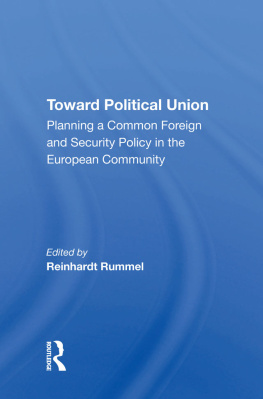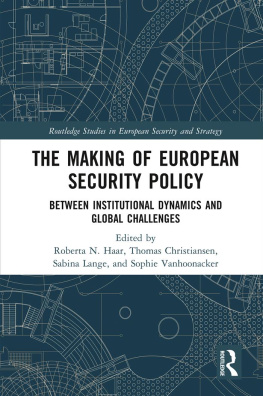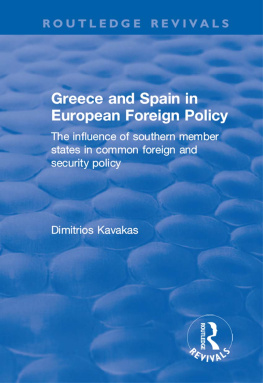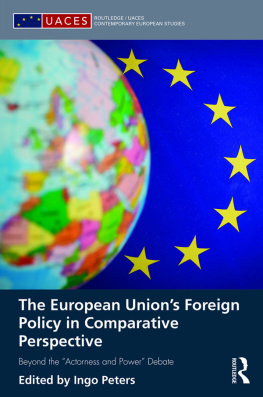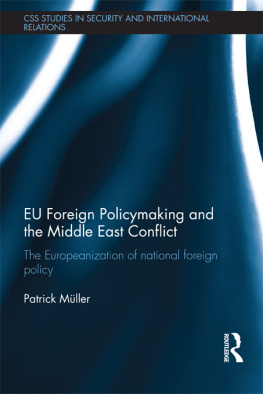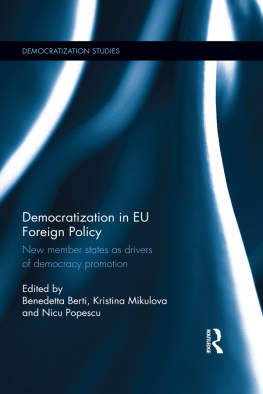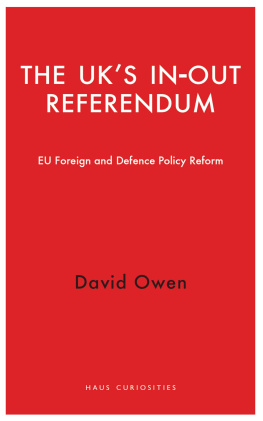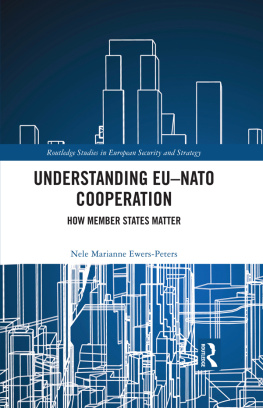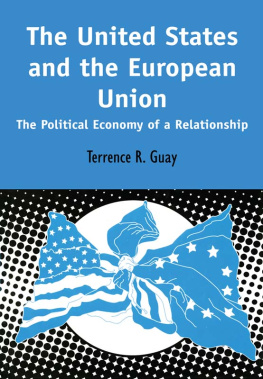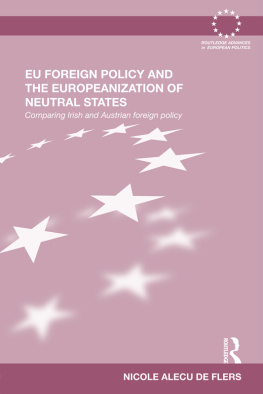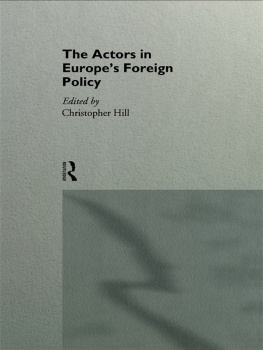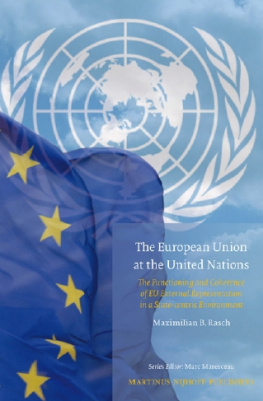Toward Political Union
Toward Political Union
Planning a Common Foreign and Security Policy in the European Community
Edited by
Reinhardt Rummel
First published 1992 by Westview Press, Inc.
Published 2018 by Routledge
52 Vanderbilt Avenue, New York, NY 10017
2 Park Square, Milton Park, Abingdon, Oxon OX14 4RN
Routledge is an imprint of the Taylor & Francis Group, an informa business
Copyright 1992 Taylor & Francis
All rights reserved. No part of this book may be reprinted or reproduced or utilised in any form or by any electronic, mechanical, or other means, now known or hereafter invented, including photocopying and recording, or in any information storage or retrieval system, without permission in writing from the publishers.
Notice:
Product or corporate names may be trademarks or registered trademarks, and are used only for identification and explanation without intent to infringe.
Library of Congress Cataloging-in-Publication Data
Toward political union: planning a common foreign and security policy in the European community / edited by Reinhardt Rummel.
p. cm.
ISBN 0-8133-8518-0
1. European Economic Community countriesForeign relations. 2. European federation.
KJE5105.T68 1992
321'.04'094dc20
91-44207
CIP
ISBN 13: 978--0-367-21186-8 (hbk)
Contents
PART ONE
The Scope of Challenges for a Common Foreign and Security Policy
Reinhardt Rummel
PART TWO
State of the Art of Common Foreign Policy and Security Cooperation: Internal Organization and External Activity
Eberhard Rhein
Maarten W. J. Lak
Simon Nuttall
Lawrence L. Hamlet
Veerle Coignez
David Allen
Christopher Hill
Scott Anderson
Geoffrey Edwards
Harald Mller
PART THREE
Perceptions and Demands from Outside: What Kind of Political Union?
Christopher W. Murray
Aleksandr Yakovenko
Kensei Hiwaki
Manfred Scheich
Istvn Krmendy
Nina Vajic
Sermet Atacanli
PART FOUR
Assessing the Concepts for Political Union: CFSP as a Touchstone
Rosa Maria Alonso Terme
Giovanni Jannuzzi
Reinhardt Rummel
ANNEX
Extracts of Selected Documents on Political Union in 1991
Guide
The Maastricht European Council meeting of December 1991 has adopted the blueprints for another step toward European Political Union. As a central element of this union, a Common Foreign and Security Policy is expected to turn the Community into a more consistent and more influential international actor. This was a timely initiative: both the international order and the relations on the European continent are in a state of thorough transformation raising many expectations for support and leadership, some of them addressed to the West European countries organized in the European Community. The Community itself cannot opt out of these demands but, as of now, has not been prepared for a qualitatively and quantitatively much wider external reach. Will the Maastricht plans facilitate closing the gap between the Community's internal preparedness and its external ambitions?
This volume attempts to provide the basis for an answer to this question. It draws on the knowledge and the assessment of insiders in the institutional machinery in Brussels as well as on the analysis and the views of experts and diplomats from outside the Community. In its four parts, the book first of all maps out the scope and the nature of the external challenges with which a Common Foreign and Security Policy is confronted. It then determines the state of the art of present Community external relations by analyzing its internal constitution and its recent performance in international tasks. In the third part, perceptions and demands from key countries outside the Community give us an idea of how such a new international actor will be received in the European and international arena. The final part is devoted to an assessment of the Maastricht Documents in the perspective of a Community on the road to political union. In preparation for Maastricht, 1991 has been a very busy year for plan designers, rapporteurs and communiqu writers. Extracts of selected documents from major institutions and member states are reprinted in the annex.
The production of the book profited from academic internationalism: on their way from Bologna, Italy, to Washington, D.C., three post-graduate students, Scott Anderson, Sylvia M. Schwaag and Ellen Thalman of the Paul H. Nitze School of Advanced International Studies, The Johns Hopkins University, stayed at the Stiftung Wissenschaft und Politik, Ebenhausen, Germany, for the summer to do most of the editorial work. I also want to thank Ursula Jung and Christine Hammann for assisting with the coordination and documentation of the book as well as Maria Maier and Lorenzo Frau for final composition of the manuscript.
Reinhardt Rummel
Part One
The Scope of Challenges for a Common Foreign and Security Policy
1
Regional Integration in the Global Test
Reinhardt Rummel
The three days in August were a real watershed. I sometimes say that what happened before the coup was, so to speak, before the new era, and after it was the beginning of a new epoch.
Mikhail Gorbachev
After the Confrontation Era: A World in Transition
At present Europe is being driven by two dynamics: integration and disintegration. While Western Europe's Heads of State and Government in Maastricht prepared to erect another pillar of the new "European Union" (EU), leaders in Moscow tried to find a consensus on the construction of a new "Union of Sovereign States" (USS). The contrast and the similarities of the two union building processes in the Western and the Eastern ends of the European continent could not be more dramatic. The failed putsch of August 1991 in the Soviet Union had given the final blow to the tumbling communist empire and thus to the postwar world order. In the wake of the coup, the Union of Soviet Socialist Republics (USSR) was formally dissolved. The legality of the Communist Party of the Soviet Union on the former territory of the USSR was suspended, and the party was outlawed in some of the republics. The military in the attempted coup d'tat turned out to be as divided and rife with social and ethnic conflicts as the society at large. While the free fall of the economy was accelerating, the republics and the remnants of the Union were trying to knit a political as well as economic safety net. At the same time, leaders from all parts of the former Soviet Union turned to the Western industrialized countries and especially to the European Community (EC) and its member states for help.
The Present Constellation
How does Western Europe's present international environment look at a time when the Community and its member states are asked both to construct their own union and to respond to demands from outside, especially to the disintegration and re-integration process in the wider Europe? Since the early fifties the West European states have been engaged in a process of regional integration, characterized by alternating deepening and widening impulses. Within this process a rapprochement of interests has come about in almost all policy areas while at the same time national particularities were reinforced. Within most policy areas a mixture of national, coordinated and communitarian policy instruments has been developed, with the competence of the Community growing significantly. The fundamental change after the end of the Cold War has not yet altered this trend, rather nurtured it.

